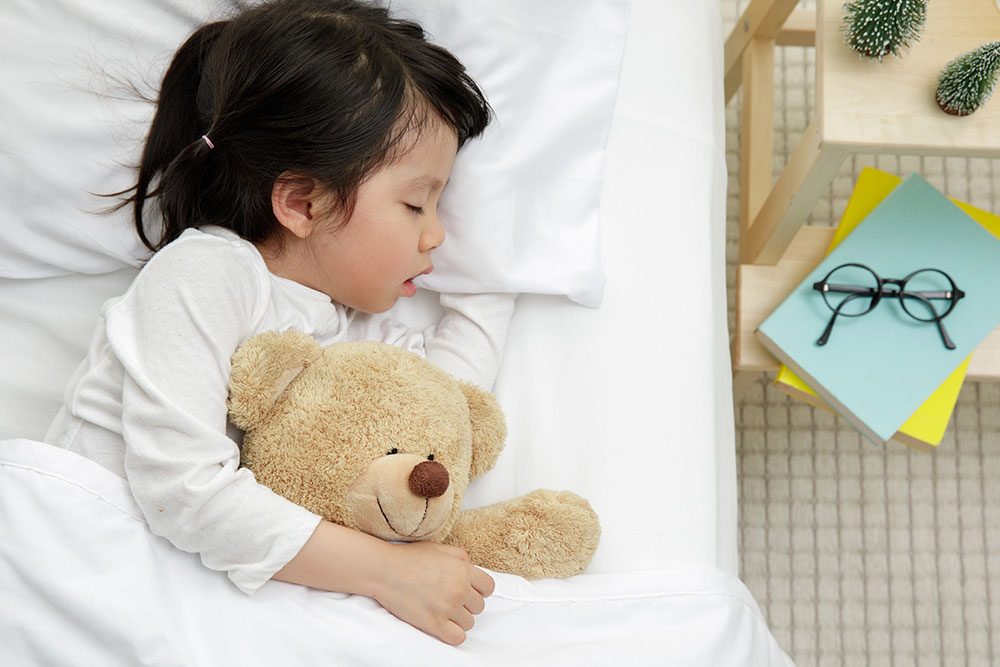Services
Pediatric Snoring
Snoring In Children
Did you know that as high as 20% or 1 in 5 children snore nightly and 30% or more snore occasionally?
Children who snore or struggle to breathe while sleeping may suffer from obstructive sleep apnea (OSA). In these cases you may hear a snort or gasp for air as they snore and their chest may appear to “suck in”. OSA is described as cessation of breathing while asleep. The stoppages in breathing are usually caused by the airway being partially or completely collapsed during sleep.
This may be caused by:
Nasal Congestion
Allergic Rhinitis
Enlarged Adenoid
Blocked Nose
Enlarged Tonsils


How do I know if my child’s snoring is serious?
Children with OSAS will typically experience some difficulty sleeping at night and behavioral problems during the day. Undiagnosed OSA has physical, mental and social impact on the child. The child may encounter problems in school; poor school results, delayed growth and development, and even heart failure.
Children who have sleep apnea may seem sluggish and may perform poorly in school. Sometimes they are labeled “slow”, “lazy”, or children with “learning problems”.
Because some of these symptoms are similar to those described in children with attention deficit hyperactivity disorder (ADHD), some children are misdiagnosed as having ADHD when they are actually suffering from OSA. These can be treated and patients will recover well.
How do I know my child has Sleep Apnea?
Sleep apnea in children can be challenging to identify, as the signs are often subtle and can overlap with other conditions. However, there are specific signs and symptoms to watch for, including:
- Frequent loud snoring
- Short periods of stoppages in breathing during the night
- Difficulty waking up, even though it seems that he/she has had adequate sleep
- Headaches in the morning, or often during the day
- Falling asleep or excessive daydreaming
- Irritable, aggressive
- Poor school results, performance

OSA Snoring Treatment for Children
For most children with OSA who have enlarged tonsils and adenoids, treatment is curative with an adeno-tonsillectomy. Children with allergic rhinitis are also treated aggressively with allergen avoidance, topical nasal steroid sprays and antihistamines (if necessary).
Snoring, Sinus & ENT Specialist
Dr Kenny Peter Pang
Ear, Nose & Throat Consultant | Otorhinolaryngologist
MBBS MRCS(Edinburgh)(UK), FRCS(Edinburgh)(UK),
FRCS(Ireland)(OTO), Masters Medicine (ORL), FAMS (Singapore)
Dr Kenny Pang is a well-trained ENT specialist with over 30 years of experience as a doctor. Dr Pang treats all forms of sleep disorders, including snoring, obstructive sleep apnoea, insomnia, narcolepsy, sleep walking, night terrors, bed wetting, and parasomnias.
Throughout his career, Dr Pang has made major contributions to the international sleep medicine field, such as his invention of the Pang’s Expansion Pharyngoplasty surgery. He is also the course director for many international surgery courses, where he contributes his medical knowledge and experience.
Aside from treating his patients, Dr Kenny Pang is a sought-after keynote speaker with over 80 invitations to speak at both local and international medical events.
Get in touch
Request an appointment or make an enquiry
Call Us Now
+65 6836 0060
Email us
drpang@asiasleepcentre.com

Frequently Asked Questions
Is snoring in children normal?
Occasional snoring in children, particularly if they have a cold or allergies, is common and typically not a cause for concern. However, if snoring occurs frequently (three or more nights a week), it may be worth investigating further.
How can I help my child at home with their snoring?
You can try:
- Maintaining a regular sleep schedule and routine
- Elevating the child’s head slightly while sleeping
- Keeping the bedroom allergen-free
- Using a humidifier if dry air is a concern
- Encouraging a healthy diet and weight management
For persistent and more serious symptoms, we recommend making an appointment with Dr Kenny Pang for proper medical intervention.
Is pediatric snoring genetic?
Genetics can play a role, especially if there’s a family history of sleep apnea or other sleep disorders. Other risk factors, like allergies, can also be inherited, which may contribute to snoring.
Will my child outgrow snoring?
Some children do outgrow snoring, particularly if it’s related to temporary factors like a cold or minor allergies. However, persistent snoring may not resolve on its own and may require treatment.